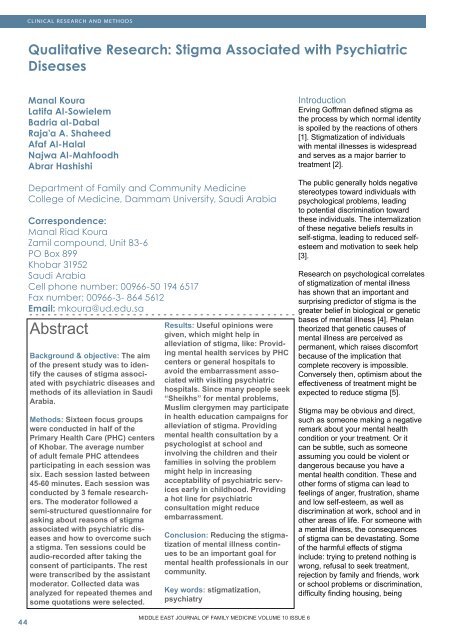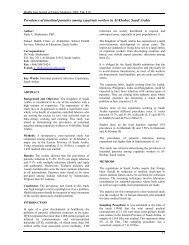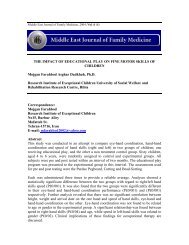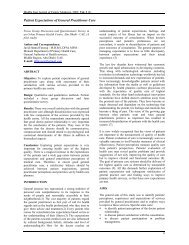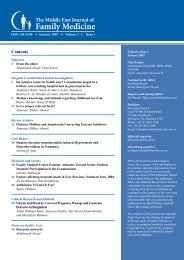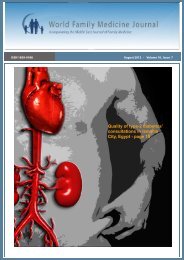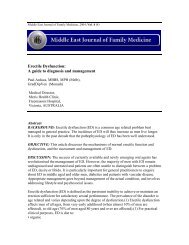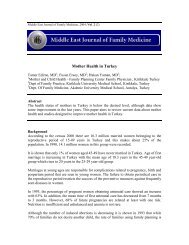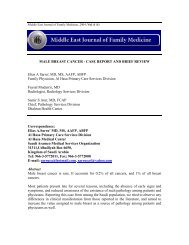full pdf of issue - Middle East Journal of Family Medicine
full pdf of issue - Middle East Journal of Family Medicine
full pdf of issue - Middle East Journal of Family Medicine
Create successful ePaper yourself
Turn your PDF publications into a flip-book with our unique Google optimized e-Paper software.
CLINICAL RESEARCH AND METHODS<br />
Qualitative Research: Stigma Associated with Psychiatric<br />
Diseases<br />
Manal Koura<br />
Latifa Al-Sowielem<br />
Badria al-Dabal<br />
Raja’a A. Shaheed<br />
Afaf Al-Halal<br />
Najwa Al-Mahfoodh<br />
Abrar Hashishi<br />
Department <strong>of</strong> <strong>Family</strong> and Community <strong>Medicine</strong><br />
College <strong>of</strong> <strong>Medicine</strong>, Dammam University, Saudi Arabia<br />
Correspondence:<br />
Manal Riad Koura<br />
Zamil compound, Unit B3-6<br />
PO Box 899<br />
Khobar 31952<br />
Saudi Arabia<br />
Cell phone number: 00966-50 194 6517<br />
Fax number: 00966-3- 864 5612<br />
Email: mkoura@ud.edu.sa<br />
Abstract<br />
Background & objective: The aim<br />
<strong>of</strong> the present study was to identify<br />
the causes <strong>of</strong> stigma associated<br />
with psychiatric diseases and<br />
methods <strong>of</strong> its alleviation in Saudi<br />
Arabia.<br />
Methods: Sixteen focus groups<br />
were conducted in half <strong>of</strong> the<br />
Primary Health Care (PHC) centers<br />
<strong>of</strong> Khobar. The average number<br />
<strong>of</strong> adult female PHC attendees<br />
participating in each session was<br />
six. Each session lasted between<br />
45-60 minutes. Each session was<br />
conducted by 3 female researchers.<br />
The moderator followed a<br />
semi-structured questionnaire for<br />
asking about reasons <strong>of</strong> stigma<br />
associated with psychiatric diseases<br />
and how to overcome such<br />
a stigma. Ten sessions could be<br />
audio-recorded after taking the<br />
consent <strong>of</strong> participants. The rest<br />
were transcribed by the assistant<br />
moderator. Collected data was<br />
analyzed for repeated themes and<br />
some quotations were selected.<br />
Results: Useful opinions were<br />
given, which might help in<br />
alleviation <strong>of</strong> stigma, like: Providing<br />
mental health services by PHC<br />
centers or general hospitals to<br />
avoid the embarrassment associated<br />
with visiting psychiatric<br />
hospitals. Since many people seek<br />
“Sheikhs” for mental problems,<br />
Muslim clergymen may participate<br />
in health education campaigns for<br />
alleviation <strong>of</strong> stigma. Providing<br />
mental health consultation by a<br />
psychologist at school and<br />
involving the children and their<br />
families in solving the problem<br />
might help in increasing<br />
acceptability <strong>of</strong> psychiatric services<br />
early in childhood. Providing<br />
a hot line for psychiatric<br />
consultation might reduce<br />
embarrassment.<br />
Conclusion: Reducing the stigmatization<br />
<strong>of</strong> mental illness continues<br />
to be an important goal for<br />
mental health pr<strong>of</strong>essionals in our<br />
community.<br />
Key words: stigmatization,<br />
psychiatry<br />
Introduction<br />
Erving G<strong>of</strong>fman defined stigma as<br />
the process by which normal identity<br />
is spoiled by the reactions <strong>of</strong> others<br />
[1]. Stigmatization <strong>of</strong> individuals<br />
with mental illnesses is widespread<br />
and serves as a major barrier to<br />
treatment [2].<br />
The public generally holds negative<br />
stereotypes toward individuals with<br />
psychological problems, leading<br />
to potential discrimination toward<br />
these individuals. The internalization<br />
<strong>of</strong> these negative beliefs results in<br />
self-stigma, leading to reduced selfesteem<br />
and motivation to seek help<br />
[3].<br />
Research on psychological correlates<br />
<strong>of</strong> stigmatization <strong>of</strong> mental illness<br />
has shown that an important and<br />
surprising predictor <strong>of</strong> stigma is the<br />
greater belief in biological or genetic<br />
bases <strong>of</strong> mental illness [4]. Phelan<br />
theorized that genetic causes <strong>of</strong><br />
mental illness are perceived as<br />
permanent, which raises discomfort<br />
because <strong>of</strong> the implication that<br />
complete recovery is impossible.<br />
Conversely then, optimism about the<br />
effectiveness <strong>of</strong> treatment might be<br />
expected to reduce stigma [5].<br />
Stigma may be obvious and direct,<br />
such as someone making a negative<br />
remark about your mental health<br />
condition or your treatment. Or it<br />
can be subtle, such as someone<br />
assuming you could be violent or<br />
dangerous because you have a<br />
mental health condition. These and<br />
other forms <strong>of</strong> stigma can lead to<br />
feelings <strong>of</strong> anger, frustration, shame<br />
and low self-esteem, as well as<br />
discrimination at work, school and in<br />
other areas <strong>of</strong> life. For someone with<br />
a mental illness, the consequences<br />
<strong>of</strong> stigma can be devastating. Some<br />
<strong>of</strong> the harmful effects <strong>of</strong> stigma<br />
include: trying to pretend nothing is<br />
wrong, refusal to seek treatment,<br />
rejection by family and friends, work<br />
or school problems or discrimination,<br />
difficulty finding housing, being<br />
44 MIDDLE EAST JOURNAL OF FAMILY MEDICINE VOLUME 10 ISSUE 6<br />
MIDDLE EAST JOURNAL OF FAMILY MEDICINE • VOLUME 7, ISSUE 10


